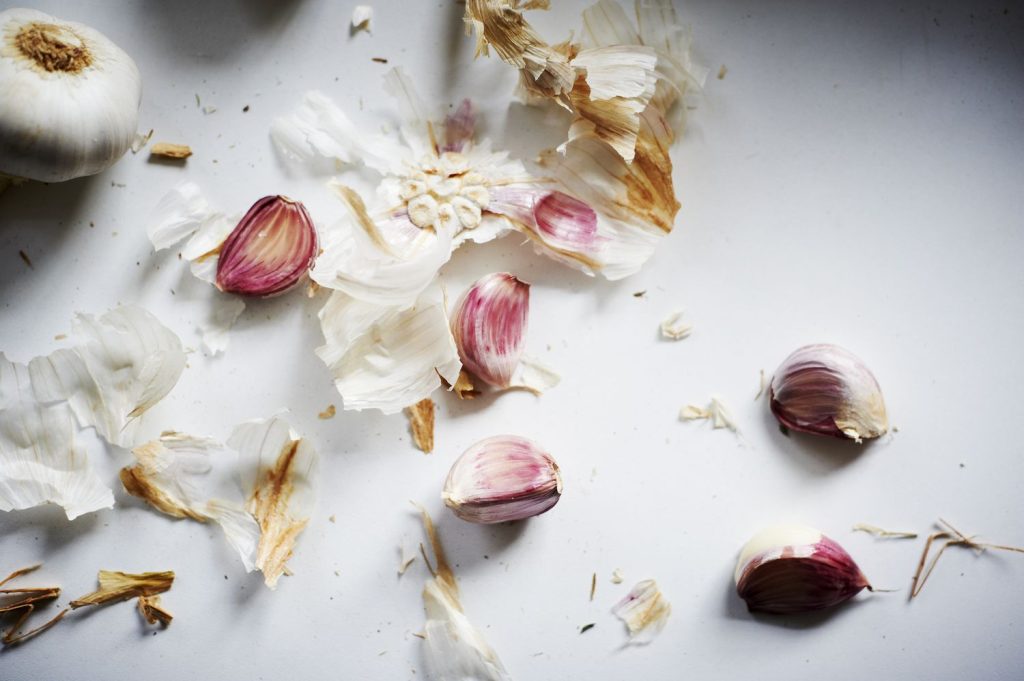There is some evidence that garlic may help lower blood pressure.
Studies show that garlic supplements or adding fresh garlic to meals may lead to a small but significant reduction in both systolic blood pressure and diastolic blood pressure. However, the effects may be more pronounced in people with hypertension (high blood pressure) than in those who are healthy.
Since the evidence is mixed, there is not enough proof to advise using garlic to treat high blood pressure.
How Does Garlic Affect Blood Pressure?
Research indicates that garlic can lower blood pressure. Garlic can help support a 16% to 40% reduction in the risk of having a cardiovascular event.
Allicin—the main bioactive compound in garlic—can help lower blood pressure by:
- Interfering with the production of angiotensin converting enzymes (ACE): These vasoconstricting factors raise high blood pressure by constricting (narrowing) blood vessels. By reducing angiotensin, allicin promotes freer blood flow and lower blood pressure.
- Creating strong antioxidative and anti-inflammatory effects: These effects may protect blood vessels from damage, such as arterial stiffness, so they can better regulate blood pressure.
- Inducing vasodilation (widen blood vessels): This possibly is done through mechanisms that include the production of nitric oxide (NO), which relaxes blood pressure walls, resulting in lower blood pressure.
A meta-analysis of 12 trials involving 553 adults with uncontrolled high blood pressure found garlic was effective in reducing blood pressure similar to the results expected with standard blood pressure drugs. In addition, garlic use showed fewer side effects than standard medications.
For subjects using garlic, this meant a reduction of 8 to 10 milligrams of mercury (mm Hg, the standard blood pressure measurement) systolic and 5 to 6 mm Hg diastolic blood pressure alone or in combination with other blood pressure medications across the studies evaluated.
While research suggests garlic can help lower your blood pressure. It should still not be considered a treatment option.
How Much Garlic Does It Take?
In the meta-analysis of 12 trials, a variety of garlic formulations in the following dosages were used to lower blood pressure, including:
- 188 milligrams (mg) of a garlic powder containing egg yolk taken daily for 12 weeks
- 240 to 2,400 mg of aged garlic extract taken daily for two to 23 weeks
- 400 mg of raw garlic taken daily for six months
- 600 to 2,400 mg of garlic powder taken daily for eight to 24 weeks
- 12.3 mg of garlic oil daily for 16 weeks
The research suggests that aged garlic extract delivered the most benefits, though results were achieved with all formulations involved. In most cases, higher doses consisting of 400 to 2,400 mg daily provided the best results.
Are Garlic Supplements Safe?
For most people, garlic supplements or garlic pills are a safe and convenient way to consume garlic when taken in the amounts directed. While garlic supplements are safe for most people when consumed as directed, you should consult with your healthcare provider before introducing garlic or any other new supplement into your daily routine.
Garlic supplements usually consist of dried and pulverized whole cloves. While garlic supplements don’t typically cause harmful symptoms, they can trigger the following side effects in some people, including:
- Abdominal pain
- Body odor
- Breath odor
- Burping
- Constipation
- Diarrhea
- Heartburn
- Nausea
- Upset stomach
- Vomiting
If you experience any of these adverse effects, discontinue using garlic supplements and contact your healthcare provider for advice. Call 911 and seek immediate medical attention if you have signs of a serious allergic reaction to garlic or other foods, which can include:
- Anaphylaxis (a life-threatening allergic reaction with symptoms such as difficulty breathing, chest tightness, irregular heartbeat, feeling of doom, or sudden cardiac arrest)
- Angioedema (significant swelling of your tongue, lips, or throat)
- Dizziness or syncope (fainting)
- Drop in blood pressure
- Repetitive vomiting or diarrhea
- Severe and widespread itching, swelling, and urticaria (hives)
- Shortness of breath or wheezing
- Widespread redness
You may be more susceptible to adverse effects from garlic if you have certain health conditions or take certain drugs. Based on research evidence, you should limit or avoid garlic supplements if you have any of the following characteristics:
- Garlic allergy: Avoid garlic in all forms if you have a known garlic allergy. If you have a food allergy to garlic, you may also have an allergy to other plants in the garlic family, which include onions, leeks, shallots, scallions, and chives.
- Gastroesophageal reflux disease (GERD), heartburn, ulcers, or other chronic conditions affecting your gastrointestinal (GI) tract: Garlic can cause irritating heartburn in anyone. If you are more susceptible to this condition, you may be more likely to experience it with garlic supplements.
- Pregnant or breastfeeding: There is little evidence to support the safe use of garlic supplements during pregnancy or while breastfeeding.
- Taking anticoagulants or other blood-thinning medications: Garlic supplements may increase the risk of bleeding if you take an anticoagulant such as Jantoven (warfarin) or Plavix (clopidogrel).
- Taking medication to lower high blood pressure: The properties of garlic that lower blood pressure may increase the effects of blood pressure–lowering medication so that your blood pressure is lowered too much.
- Preparing for surgery: Since garlic may increase the risk of bleeding, it may not be safe for people undergoing surgery. Advise your healthcare provider about your use of garlic supplements if you are scheduled for surgery of any kind, including dental surgery.
Garlic supplements may also impact the effectiveness and predictability of the following drugs:
Can It Replace Medication?
While research suggests that garlic provides benefits similar to blood pressure medication in some people, there is no scientific evidence that garlic is an appropriate replacement for prescribed conventional medications.
Other Ways to Lower Blood Pressure Naturally
Your healthcare provider is the best resource for advice on ways to lower blood pressure naturally. The effectiveness of natural blood pressure remedies depends on several factors, including genetics. These conditions usually require medications. Most people with high blood pressure benefit from a combination of medication and natural remedies that include lifestyle changes known to impact blood pressure.
Depending on your blood pressure category—having a normal blood pressure, an elevated blood pressure, or hypertension—you may be able to lower blood pressure naturally with one of the following strategies:
- Stop smoking: Smoking can increase your blood pressure and worsen existing high blood pressure.
- Follow a healthy diet: Lower your salt intake and follow the DASH diet (Dietary Approaches to Stop Hypertension diet), which can often help achieve and maintain healthy blood pressure. The diet is rich in whole grains, lean protein, nuts, legumes, and low-fat dairy. It limits saturated fat, cholesterol, sugar, and red meat.
- Limit alcohol: Drinking too much alcohol can increase your blood pressure. To avoid excess alcohol, the American Heart Association advises that men who drink alcohol limit their intake to two drinks daily. Women should consume no more than one daily drink.
- Lose weight if you are overweight or obese: While most people can reach and maintain a healthy body weight with a combination of diet and exercise, consult your healthcare provider for alternative healthy options if your efforts do not work.
- Stay active: To lower blood pressure, the American Heart Association advises that you aim for 150 minutes (about 2.5 hours) of moderate-intensity exercise or 75 minutes of vigorous aerobic activity weekly. Incorporate strength training exercise es at least twice weekly to support overall good health.
- Manage stress: Consider the sources of stress and work to reduce them. Most people can reduce stress and tension with a combination of social connection, relaxation, and a regular sleep schedule of at least seven hours nightly. Other practices, such as practicing meditation, gratitude, and joy, may also help lower blood pressure.
In addition to garlic, research suggests that the following dietary supplements may also help to lower blood pressure:
Summary
Though the evidence is limited, studies show that garlic may provide the same benefits as some blood pressure drugs while offering a lower risk of side effects.
Garlic is considered safe for most people to consume. However, garlic poses the risk of drug interactions and other side effects for some. You may have side effects if you have GERD, heartburn, or other GI conditions. Garlic may also pose potential health risks for people taking certain drugs such as blood thinners.
Consult your healthcare provider before you use garlic or any new supplement to treat a health problem such as high blood pressure. While garlic may lower blood pressure in some people, using it to replace a prescribed drug may risk your well-being.
-
Ried K. Garlic lowers blood pressure in hypertensive subjects, improves arterial stiffness and gut microbiota: A review and meta-analysis. Exp Ther Med. 2020 Feb;19(2):1472-1478. doi:10.3892/etm.2019.8374
-
Wang HP, Yang J, Qin LQ, Yang XJ. Effect of garlic on blood pressure: a meta-analysis. J Clin Hypertens (Greenwich). 2015 Mar;17(3):223-31. doi:10.1111/jch.12473
-
Sleiman C, Daou RM, Al Hazzouri A, Hamdan Z, Ghadieh HE, Harbieh B, Romani M. Garlic and hypertension: efficacy, mechanism of action, and clinical implications. Nutrients. 2024 Aug 29;16(17):2895. doi:10.3390/nu16172895
-
Oregon State University. Garlic and organosulfur compounds.
-
Food Allergy Research & Education. Recognizing and treating reaction symptoms.
-
Merck Manual Consumer Version. Garlic.
-
National Center for Complementary and Integrative Health. Garlic.
-
Mount Sinai. Garlic.
-
American Heart Association (AHA). How to manage high blood pressure.
-
Saladini F, Benetti E, Fania C, Mos L, Casiglia E, Palatini P. Effects of smoking on central blood pressure and pressure amplification in hypertension of the young. Vasc Med. 2016;21(5):422-428. doi:10.1177/1358863X16647509
-
National Heart, Lung, and Blood Institute. DASH Eating Plan.
-
American Heart Association. Limiting alcohol to manage high blood pressure.
-
American Heart Association. Managing weight to control high blood pressure.
-
American Heart Association. Getting active to control high blood pressure.
-
Afolayan AJ, Wintola OA. Dietary supplements in the management of hypertension and diabetes – a review. Afr J Tradit Complement Altern Med. 2014 Apr 3;11(3):248-58. doi:10.4314/ajtcam.v11i3.35
-
Matsutomo T. Potential benefits of garlic and other dietary supplements for the management of hypertension. Exp Ther Med. 2020 Feb;19(2):1479-1484. doi:10.3892/etm.2019.8375
:max_bytes(150000):strip_icc()/IMG_09172-9ca0040fa5e74df0b5aac42d8125d477.jpeg)
By Anna Giorgi
Giorgi is a freelance writer with more than 25 years of experience writing health and wellness-related content.
Thanks for your feedback!
What is your feedback?








